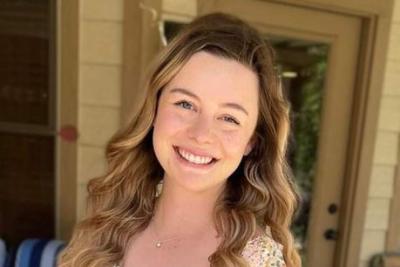The School of Communication offers four undergraduate majors: Journalism, Communication Analysis & Engagement, Communication Technology and Strategic Communication. Its graduate program also creates educational and professional opportunities for both students and graduates.
Undergraduate: Journalism
Ohio State’s hands-on journalism curriculum gives students the opportunity to work in state-of-the-art classrooms and lab settings to perfect their writing, editing and multimedia skills.
Ohio State’s major in Public Affairs Journalism gives students that have a passion for investigating and disseminating news information the opportunity to work for The Lantern, an award-winning student media group, as early as their freshman year. The Lantern was recently named “Best Ohio Student Newspaper” by the Ohio Newspaper Association and secured another 12 additional awards.
Journalism majors are required to complete a news-based internship as well as a minor in a secondary content area so that they can develop a deeper knowledge of a subject area they hope to report on. Internships have included NBC’s Today show, The Columbus Dispatch, Big Ten Network and radio stations. The program addresses the changing landscape of journalism by pairing foundational print journalism skills with the ever-changing multimedia skill set needed by today's journalists.

“I’ve known I wanted to pursue journalism since I was 16 years old, and the program at Ohio State has really helped me grow and cement my passion for the field. The major includes a lot of classes that I think are imperative to hone in on your skills as well as become more confident in yourself.
The most important aspect of the major is that you have classes that have you work for The Lantern. That hands-on experience is more than you could ever learn in a classroom. I have created and explored different aspects of the major to where I am now confident in what I produce and continue to aspire to do better.
Because of the classes and experience I have gotten with The Lantern, I chose to apply to be Editor-in-Chief, and I got it. While the position is a daunting one, I have a great support system at The Lantern and am excited to take on the challenges and improve the already great paper. I’m grateful for the professors who have helped me and the friends I have made with The Lantern.
The major itself has professors, TAs and editors who are really there to help others in the field to grow as a journalist and as a person. I also hope to work at a newspaper after I graduate, creating both video and print content.”
Undergraduate: Communication Analysis & Engagement
Communication Analysis and Engagement is a broad-based education that focuses on how communication affects society, and how communication can improve society. Students learn to analyze the uses and effects of media in society, how public advocates and international communication systems operate and how diversity and culture affect communication in community life.
Students learn the communication practices that help build and maintain important relationships in personal and corporate life, and they learn how communication interventions and campaigns can improve the public’s understanding of pressing public issues like health, science and the environment.
This specialization prepares students to become critical thinkers and effective problem-solvers for careers in both the public and private sectors, such as in business management, government relations, or as communication specialists in a health or political organization. The specialization also provides excellent preparation for graduate school or law school.

"In the summer of 2020, I realized how powerful and important the media was and the influence it had on society. I wanted to enter a field where I could accurately reflect the world through storytelling. Journalism has allowed me to do that while my communications analysis and engagement major has helped me in understanding and communicating with others and the public. I have many aspirations including journalism, the field of communication and possibly the route of law school. Whichever path I choose, I know the skills I have developed and continue to develop, will help me succeed and excel in my future career. I am furthering my connections in both my communication analysis and engagement and journalism majors, while hopefully expanding my options and potential."
Undergraduate: Communication Technology
Communication Technology explores the way technology is transforming the field of communication. This specialization helps students understand interactive technology, evaluate the user experience, and communicate with users with varying levels of technical proficiency. Students in this major can choose courses in Human-Computer Interaction and User Experience (HCI + UX) and Communication Technology Management.
Many students in this major go on to pursue jobs such as:
- Product Marketing Manager
- Manager IT Compliance
- Systems Analyst
- Purchasing Assistant
- Digital Marketing Manager
- System Administrator
- User Interface Specialist
- Web Designer and Developer
- Social Media Coordinator
- Video Game Marketer
- UX Researcher
- IT Coordinator
- Business Support Analyst
- Project Manager/Strategist

“During my internship with St. Vincent de Paul, I learned about social media marketing within the nonprofit sector. I enjoyed the opportunity to use my creative skills within an organization that helps others. This internship solidified my interest in pursuing social media marketing as a career.”
Undergraduate: Strategic Communication
Strategic Communication, the largest major in the school with 580 students, teaches how to develop campaign goals and think strategically to influence stakeholders, the public, and other audiences in order to accomplish an organizational objective. This specialization integrates theory, real-world practice, and skills training, and examines communication through public relations, marketing, crisis communication, advertising, persuasion theory, and communication campaigns.
Students train for careers such as public relations specialists, communication specialists, marketing, communication campaign and information managers, and communication consultants.

“When I was a junior in high school, I decided Ohio State was the school for me almost entirely because of its Strategic Communication major. I decided a career in public relations was what I wanted to pursue early on, but I had no idea where to go from there. Most schools offer a communication major, but that still seemed rather broad for my professional goals. Eventually, I stumbled upon The Ohio State University School of Communication’s specializations. Strategic communication was exactly what I was looking for.
Shortly after arriving on campus, I joined Ohio State’s chapter of Public Relations Society of America to further explore the PR field. With industry speakers every week and the opportunity to serve on the executive board with my peers, PRSSA has enriched my education incredibly.
As I prepare to graduate this semester, I am so grateful for the strategic communication major. I can confidently say I now possess the communication skills necessary for a career in PR because of my courses in the major and my relevant extracurriculars.”
Certificates
In addition to the four majors, The School of Communication offers undergraduate certificate programs.
The Health Communication certificate program is designed for undergraduate students interested in pursuing post-baccalaureate careers or graduate education in health-related sectors. The certificate program provides a comprehensive education on all aspects of health communication, including a focus on health message design, media campaign planning, and interpersonal communication in healthcare settings.
The Science and Environmental Communication certificate program educates students on the theory and practice of communicating about scientific, environmental, and/or sustainability topics and issues. It aims to provide an opportunity for developing lifelong professional communication skills and highlights the interdisciplinary social-behavioral, educational, and psychological dimensions of science and environmental communication.
Graduate Program
The School of Communication also offers a unique graduate program for studying the underlying mechanisms and theoretical explanations for communication phenomena. The school offers full funding to every student we admit to our M.A. and Ph.D. programs in the form of either a Graduate Associateship or Graduate Fellowship.
The School of Communication emphasizes the interconnectedness of various subfields in communication in key focus areas, including:
- Communication Technology and Society
- Health, Environment, Risk, and Science Communication
- Mass Communication Uses and Effects
- Political Communication and Public Opinion

“While it’s difficult to end a chapter and enter into a new one, I’m very appreciative of my time and collaborations and everything that I’ve learned at Ohio State. The communication program is excellent in training students on how to research whatever they’re interested in in the communication realm. There were so many opportunities to work with faculty members on narrative projects and entertainment and media effects that it was just too good of an opportunity to pass up. I got all the necessary tools as a doctoral student to research the impact of narratives and entertainment. I’ll absolutely miss it.”
Article by student Jane Parry
